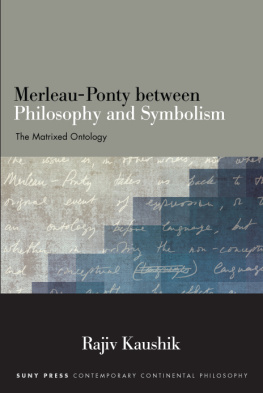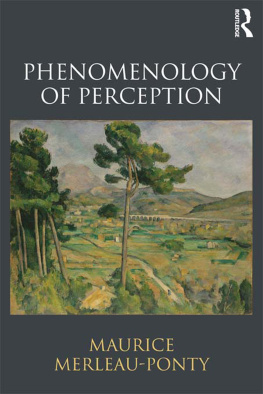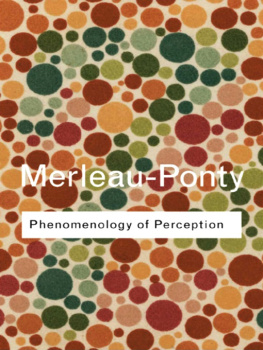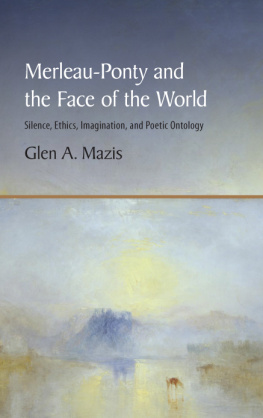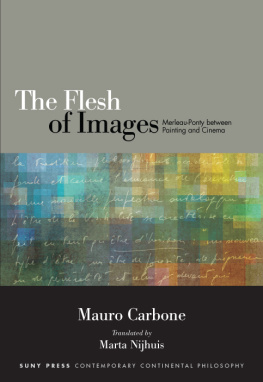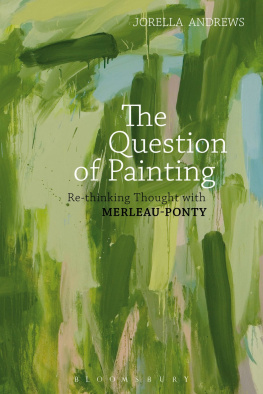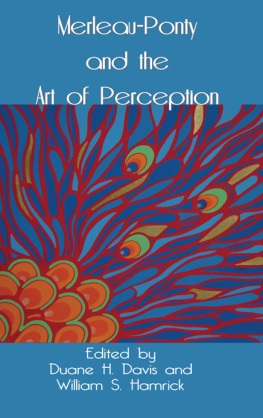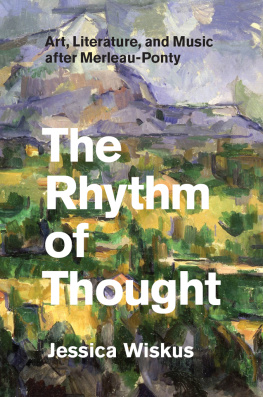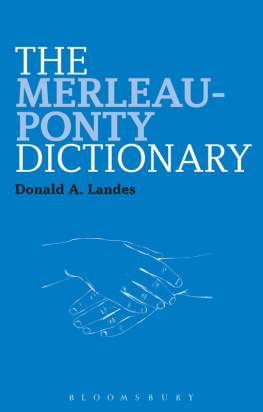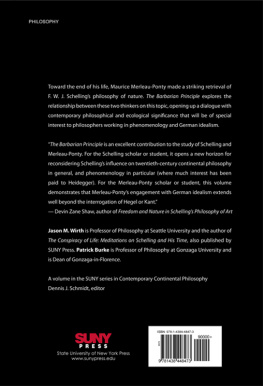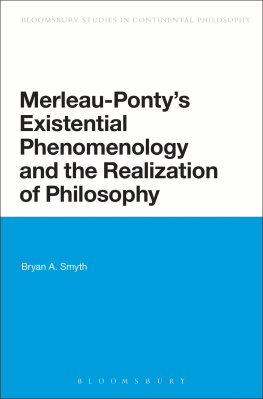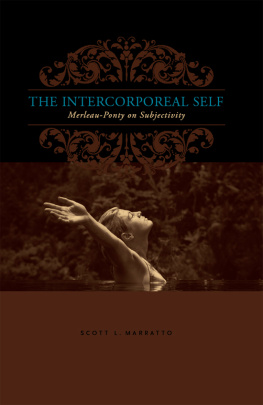Merleau-Ponty between
Philosophy and Symbolism
SUNY series in Contemporary Continental Philosophy
Dennis J. Schmidt. editor
Merleau-Ponty between
Philosophy and Symbolism
The Matrixed Ontology
Rajiv Kaushik
Published by State University of New York Press, Albany
2019 State University of New York
All rights reserved
Printed in the United States of America
No part of this book may be used or reproduced in any manner whatsoever without written permission. No part of this book may be stored in a retrieval system or transmitted in any form or by any means including electronic, electrostatic, magnetic tape, mechanical, photocopying, recording, or otherwise without the prior permission in writing of the publisher.
For information, contact State University of New York Press, Albany, NY
www.sunypress.edu
Library of Congress Cataloging-in-Publication Data
Names: Kaushik, Rajiv, author.
Title: Merleau-Ponty between philosophy and symbolism : the matrixed ontology / Rajiv Kaushik.
Description: Albany : State University of New York Press, [2019] | Series: SUNY series in contemporary continental philosophy | Includes bibliographical references and index.
Identifiers: LCCN 2018058274 | ISBN 9781438476759 (hardcover : alk. paper) | ISBN 9781438476773 (ebk.)
Subjects: LCSH: Merleau-Ponty, Maurice, 1908-1961. | Ontology. | Identity (Philosophical concept)
Classification: LCC B2430.M3764 K385 2019 | DDC 194--dc23 LC record available at https://lccn.loc.gov/2018058274
10 9 8 7 6 5 4 3 2 1
Contents
Abbreviations
| p/ IPP : | loge de la Philosophie et autres essais (France: Gallimard, 1960), translated by John ONeill as In Praise of Philosophy and Other Essays (Evanston, IL: Northwestern University Press, 1970). |
| Hes : | Prface, in A. Hesnard, Luvre de Freud , 510 (France: Payot, 1960), translated by Alden L. Fisher as Phenomenology and Psychoanalysis: Preface to Hesnards LOeuvre de Freud, Review of Existential Psychology and Psychiatry 18 (1982): 6772. |
| HT : | Humanisme et terreur, essai sur le problme communiste (France: Gallimard, 1947), translated by John ONeill as Humanism and Terror: An Essay on the Communist Problem , translated by John ONeill (Boston: Beacon Press, 1969). |
| IP : | LInstitution, Passivit: Notes de Cours au Collge de France (19541955) (France: ditions Belin, 2003), translated by Leonard Lawlor and Heath Massey as Institution and Passivity: Course Notes from the Collge de France (19541955) (Evanston, IL: Northwestern University Press, 2010). |
| MPR : | The Merleau-Ponty Reader , edited by Ted Toadvine and Leonard Lawlor (Evanston, IL: Northwestern University Press, 2007). |
| N : | La Nature, Notes, Cours du Collge de France (France: Seuil, 1995), translated by Robert Vallier as Nature: Course Notes from the Collge de France (Evanston, IL: Northwestern University Press, 2003). |
| NC : | Notes de cours: 19581959 et 19601961 (France: Gallimard, 1996). |
| OE/EM: | Lil et lesprit (France: Gallimard, 1964), translated as Eye and Mind in Primacy of Perception and Other Essays , edited by James E. Edie (Evanston, IL: Northwestern University Press, 1964). |
| Par : | Parcours deux, 19511961 (France: Verdier, 2000). |
| PNP : | Philosophy and Non-Philosophy Since Merleau-Ponty , edited by Hugh J. Silverman (United Kingdom: Routledge, 1988). |
| PP : | Phnomnologie de la perception (France: Gallimard, 1945), translated by Colin Smith as Phenomenology of Perception (United Kingdom: Routledge, 1992). |
| PrP : | Le Primat de la perception et ses consequences philosophiques (France: Verdier, 1996) translated as Primacy of Perception and Other Essays , edited by James E. Edie (Evanston, IL: Northwestern University Press, 1964). |
| PW : | La Prose du monde (France: Gallimard, 1969), translated by John ONeill as The Prose of the World (Evanston, IL: Northwestern University Press, 1973). |
| RLL : | Recherches sur lusage littraire du langage: Cours au Collge de France Notes, 1953 , (Switzerland: MtisPresses, 2013). |
| S : | Signes (France: Gallimard, 1960), translated by Richard C. Mcleary as Signs (Evanston, IL: Northwestern University Press, 1964). |
| SNS : | Sens et non-sens (France: Gallimard, 1996), translated by Hubert L. Dreyfus and Patricia Allen Dreyfus as Sense and Non-sense (Evanston, IL: Northwestern University Press, 1964). |
| VI : | Le Visible et linvisible, suivi de notes de travail (France: Gallimard, 1964), translated by Alphonso Lingis as The Visible and the Invisible (Evanston, IL: Northwestern University Press, 1968). |
Note: French pagination is cited first, then the English.
Acknowledgments
I would like to begin by thanking the International Merleau-Ponty Circle and its members. The Merleau-Ponty Circle is my intellectual home and much of my development is thanks to its investment in less-established scholars. I would specifically like to thank Duane Davis for inviting me to my first Merleau-Ponty Circle in Asheville in 2010. That was when I met several people, in addition to Duane, who continue to be significant to me personally and intellectually: Frank Chouraqui, Bernie Flynn and Judith Waltz, Vronique Fti, Mauro Carbone, Stephen Watson, Galen Johnson, Gail Weiss, Glen Mazis, and Helen Fielding. These are all scholars whose work and thought are a constant source of inspiration and guidance. One need only read them to witness a generosity and good politics of thought: a kind of thinking that allows room for more and even different thinking.
I would again like to thank Duane Davis for reading chapters of this volume in different stages of their development and giving me some vitally important suggestions. I also want to thank Cheryl Emerson for inviting me to the University of Buffalo in April of 2017. Some of the ideas from the talk I gave there, along with certain arguments I began in recent articles in Chiasmi International (Separations and Symbolics and Lighten Up), have developed into the present book. Cheryls comments on the talk were also invaluable. I finally offer my deep gratitude to my colleague, friend, and constant ally, Drew Dalton, whose influence can certainly be found in these pages too, and whose friendship has kept me from dark and given me light these many years.
This book is dedicated to the members of my beloved family, who, like my own breath and lungs, constellate my inner and outer worlds: Natalie, Violeta, and Zubin.
Introduction
T here is nothing about predictability that guards against unpredictability, nothing about it that guarantees the unpredictable will remain quiet. The predictable is not certain and does not exclude the unpredictable. Whereas the unpredictable intervenes in the predictable and interrupts the very scene in which its previous appearance would seem impossible. It ruptures. Referring to the notion formalized by set-theory ontology as the void set, Alain Badiou calls this rupture an event. If there is an event, in other words, the very conditions of existence, cohesion and unity, have been removed. Normality is perturbed, and a totally new space is opened up to rethink reality.

